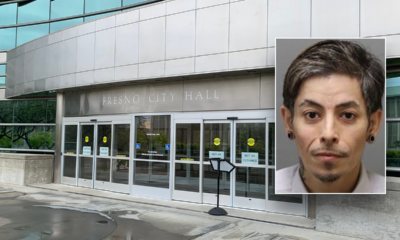California
Businesses Must Determine Before 2025 If They Fall Under California Climate Reporting Law

California State Capitol building with state flag in Sacramento on a windy summer day with clear sky
In 2023, California approved the Climate Accountability Package, a pair of bills aimed at creating climate reporting requirements. Reporting is set to begin in 2026 for data collected during 2025. Companies need to determine now if they are required to report and establish the processes to collect the data. However, delays in drafting the standards and ambiguous language are making it difficult for businesses to determine if they qualify.
The Rise of Climate Reporting
California’s climate reporting regulation is part of a global movement to require companies to disclose their greenhouse gas emissions, climate policies, and to evaluate climate risks. Driven by the net zero 2050 goal of the Paris Agreement, jurisdictions around the world are looking to reduce GHG emissions.
The European Union has been leading the way with the Corporate Sustainability Reporting Directive. Initially adopted in 2022, the CSRD requires climate and environmental, social, and governance reporting by most companies that operate within the EU. Reporting for large companies began in 2024. Reporting for non-EU companies and small and medium-sized enterprises has been delayed to 2026.
In the U.S., the Securities and Exchange Commission adopted a Climate-Risk Disclosure Rule in early 2024, only to delay implementation while it faced legal challenges. California and other states are moving forward with their own reporting requirements.
California’s Climate Accountability Package established the broad parameters for the reporting standards. The responsibility of drafting specific regulations and implementing the reporting standards was delegated to the California Air Resources Board. CARB was initially given until January 1, 2025 to draft the rules and processes. In September, the Legislature extended the deadline by six months to July 1.
The original legislation states that CARB shall develop and adopt regulations requiring for the reporting entity’s prior fiscal year.” Meaning, while the reporting does not take place until 2026, the data is from 2025. Businesses must determine before January 1, 2025 if they qualify as a reporting entity so they can begin collecting the required information.
Reporting requirements are divided into two categories, based on the total annual revenue of the company. Unlike the SEC, the California reporting requirements apply to both publicly traded and privately held companies. Only U.S. companies will have to report.
Reporting Entities
The highest level of reporting is required of large companies. Senate Bill 253 required companies who do business in California and have an excess of $1 billion in revenue, defined as “reporting entities”, to submit an annual report for Scope 1 and Scope 2 starting in 2026. Scope 3 reporting will begin in 2027.
Generally, Scope 1 GHG emissions are those that come directly from the company. Scope 2 are indirect GHG emissions from the company’s power source. Scope 3 are GHG emissions from the value chain, both from suppliers and consumers.
Scope 3 has been highly debated as it is considered by the business community as being overly burdensome. When the SEC implemented their rule, they chose to not require Scope 3. The EU requires it.
Covered Entities
Senate Bill 261 required companies who do business in California and an excess of $500 million in revenue, defined as “covered entities”, to submit a biennial climate-related financial risk report.
Climate risk is defined as “material risk of harm to immediate and long-term financial outcomes due to physical and transition risks, including, but not limited to, risks to corporate operations, provision of goods and services, supply chains, employee health and safety, capital and financial investments, institutional investments, financial standing of loan recipients and borrowers, shareholder value, consumer demand, and financial markets and economic health.”
This is a much lower requirement as it does not include any level of GHG emission reporting.
What Classifies As “Doing Business in California”?
In the development and interpretation of law, words matter. Codes, ordinances, laws, and regulations typically begin with a list of definitions of key terms. Frequently, those definitions are prefaced with the phrase “for purposes of this section.” This allows lawmakers to define a term for limited use in that section of the law preventing new legislation from negatively impacting established law. Definitions bring clarity, allowing those subjected to the law, regulators, attorneys, and judges to know the exact intent of the lawmakers.
In the Climate Accountability Package, the phrases “covered entity” and “reporting entity” are both defined in their respective sections. The only notable distinction between the definitions is the annual revenue threshold. Both include the phrase “that does business in California.”
While the dollar amount thresholds are clear, there is a question as to what classifies as “doing business” in California. The definition varies by section of the state code and by state agency. The Climate Accountability Package amended the state’s Health and Safety Code, that does not have a definition of doing business.
Presumably, CARB will provide a clear definition when they release the standards in July. However, companies will need to determine by January 1 if they need to collect data. In the interim, there are two key definitions that help provide some guidance.
California Corporations Code
Section 191 (a) of the California Corporations Code gives a definition of “entering into repeated and successive transactions of its business in this state, other than interstate or foreign commerce.” However, that definition is for the phrase “transact intrastate business” and is only for “the purposes of Chapter 21”, requiring registration with the Secretary of State.
Notably, “a foreign corporation shall not be considered to be transacting intrastate business merely because its subsidiary transacts intrastate business.” This leaves raises a question as to if a subsidiary can trigger reporting by the parent company. The 2024 amendment clarified that a subsidiary does not have to file separate from the parent company, but did not address this question.
California Revenue and Taxation Code
Article 1, Section 23101(a) of the California Revenue and Taxation Code gives a definition of “doing business.” The California Franchise Tax Board interprets the definition to mean meeting one of five conditions. The board updates the dollar thresholds annually. A company is considered doing business in California if
- The company is “actively engaging in any transaction for the purpose of financial or pecuniary gain or profit”;
- The company is “organized or commercially domiciled” in the state;
- The company has annual sales in California exceed the lower of $711,538 or 25% of the company’s total sales;
- The company has real property or tangible personal property in California exceeds the lower of $71,154 or 25% of the company’s total; or
- The company has payroll compensation in California exceeds the lower of $71,154 or 25% of the company’s total payroll.
The Struggle For Businesses
While there will likely be a delay in implementing California’s climate reporting requirements, companies have to decided soon how to respond. The choice comes with a hefty price tag. The SEC estimated compliance with their rule would cost a company approximately $1 million the first year. There is no reason to think California’s will be any different. As a result, companies are faced with a difficult decision – move forward with costly programs or hope for a delay.
There are a lot of unanswered questions while CARB drafts the climate reporting standards. However, given the current timeline, companies need to act now to evaluate if they meet the minimums and get their process in place by January 1.

California
‘Not a done deal’: California vows ‘vigorous’ review of Paramount-Warner Bros takeover

Rob Bonta, California’s attorney general, said his office will investigate a possible merger between Paramount Skydance and Warner Bros Discovery, hours after Netflix backed away from a planned takeover.
“Paramount/Warner Bros is not a done deal,” Bonta said in a post on X. “These two Hollywood titans have not cleared regulatory scrutiny — the California Department of Justice has an open investigation, and we intend to be vigorous in our review.”
Any acquisition of Warner Bros would require approval from regulators in the United States and Europe, including the US justice department’s antitrust division. The deal Paramount struck for Warner is valued at nearly $111bn.
The merger poses a risk for California’s economy. Paramount’s bid is likely to raise concerns about job cuts in the state, which also dogged Netflix’s bid. Paramount sees $6bn in cost “synergies” in the deal, which typically means massive layoffs, reducing the number of suppliers, squeezing existing contractors for better terms after the two companies merge or other reductions.
The chief executive of Paramount, David Ellison, said his company was pleased the Warner Bros board had “unanimously affirmed the superior value of our offer”, which he said delivered “WBD shareholders superior value, certainty and speed to closing”. Ellison is the son of Oracle co-founder Larry Ellison, a close ally of Donald Trump.
On Friday, Warner Bros Discovery reportedly agreed to be acquired by Paramount Skydance. Reuters and Deadline reported that the deal was announced in a global town hall by the company. Paramount and Warner Bros did not immediately confirm the deal to the Guardian.
A merger between the two media giants is also facing backlash from several lawmakers. Senator Elizabeth Warren, a key voice against growing monopolies, echoed Bonta’s concerns after Netflix walked away from the deal on Thursday, and noted that Netflix CEO Ted Sarandos was seen at the White House shortly before the company said it would bow out of the deal.
“A Paramount Skydance-Warner Bros merger is an antitrust disaster threatening higher prices and fewer choices for American families,” Warren said in a statement. “What did Trump officials tell the Netflix CEO today at the White House? A handful of Trump-aligned billionaires are trying to seize control of what you watch and charge you whatever price they want.”
The senator added: “With the cloud of corruption looming over Trump’s Department of Justice, it’ll be up to the American people to speak up and state attorneys general to enforce the law.”
On Friday, Bonta responded to concerns about the merger posted by actor Mark Ruffalo.
“Please let’s circle up all the State AG’s and talk about how this is going to kill completion in the industry and drive down wages, and product quality for consumers,” Ruffalo posted.
“There are lots of agents in Hollywood who can tell you how past mergers and consolidations have hurt their clients and business. There is lots of talent that can tell you the same.”
Bonta reposted the actor’s comments, responding that he is in “conversation with my AG colleagues about Paramount/Warner Bros”.
The California department of justice did not immediately respond to a request for comment from the Guardian.
The Writers Guild of America, the union representing thousands of television and film writers along with other media workers, has said a Paramount takeover of Warner Bros would hurt jobs.
Warner Bros canceled $2bn in content after merging with Discovery in 2022, and Paramount’s recent merger with Skydance led to 1,000 layoffs, the union said in written testimony to the US Senate.
California
Amid angry backlash, serial child molester is rearrested the same day he was set to be paroled

Following major backlash about the scheduled release of a serial child molester through California’s elderly parole program, the 64-year-old is now facing new charges that could keep him behind bars.
News that David Allen Funston was set to be freed was met by outrage among victims, politicians and others. The former Sacramento County district attorney who prosecuted Funston said she was strongly opposed to his release: “This is one I’m screaming about.”
Funston, granted parole earlier this month, was set to be released on Thursday from state prison — but was rearrested that same day on new charges from a decades-old, untried case. The charges he’s facing are from a 1996 case in which he is accused of sexually assaulting a child in Roseville, according to the Placer County district attorney’s office.
In 1999, he was convicted of 16 counts of kidnapping and child molestation and had been serving three consecutive sentences of 25 years to life and one sentence of 20 years and eight months at the California Institution for Men in Chino. The sentences followed a string of cases out of Sacramento County in which prosecutors said Funston lured children under the age of 7 with candy and, in at least one case, a Barbie doll to kidnap and sexually assault them, often under the threat of violence.
He was described by a judge at his sentencing hearing as “the monster parents fear the most.”
Prosecutors in Placer County, at the time, decided not to pursue the case against Funston in Roseville given the severity of the sentences he received in Sacramento County.
But given his scheduled release from state prison, prosecutors decided to file new charges against him. Placer County Dist. Atty. Morgan Gire said “changes in state law and recent parole board failures” led to his improper release.
“This individual was previously sentenced to multiple life terms for extremely heinous crimes,” Gire said in a statement. “When changes in the law put our communities at risk, it is our duty to re-evaluate those cases and act accordingly. David Allen Funston committed very real crimes against a Placer County child, and the statute of limitations allows us to hold him accountable for those crimes.”
He is now being held without bail in the Placer County jail, booked on suspicion of lewd and lascivious acts against a child, according to prosecutors. Funston’s attorney, Maya Emig, said she had only recently learned about his arrest and hadn’t yet had time to fully review the matter.
But she noted that she believes “in the justice system and the rule of law.”
Emig called the Board of Parole Hearings’ decision to grant Funston elderly parole “lawful and just.”
California’s elderly parole program generally considers the release of prisoners who are older than 50 and have been incarcerated for at least 20 continuous years, considering whether someone poses an unreasonable risk to public safety.
In Funston’s case, commissioners said they did not believe Funston posed a significant danger because of the extensive self-help, therapy work and sex offender treatment classes he completed, as well as his detailed plan to avoid repeating his crimes, the remorse he expressed and his track record of good behavior in prison, according to a transcript from the Sept. 24 hearing.
At the hearing, Funston called himself a “selfish coward” for victimizing young children, and said he was “disgusted and ashamed of my behavior and have great remorse for the harm I caused my victims, their families in the community of Sacramento.”
“I’m truly sorry,” he said.
But victims of his crimes, as well as prosecutors and elected leaders have questioned the parole decision and called for its reversal.
“He’s one sick individual,” a victim of Funston’s violence told The Times. “What if he gets out and and tries to find his old victims and wants to kill us?”
A spokesperson for Gov. Gavin Newsom said the governor also did not agree with Funston’s release and had asked the board to review the case. However, Newsom has no authority to overturn the parole decision.
Some state lawmakers also cited Funston’s case as evidence that California’s elderly parole program needs reform, recently introducing a bill that would exclude people convicted of sexual crimes from being considered by the process.
California
Video shows skier dangling from chairlift at California ski resort

Thursday, February 26, 2026 7:21PM
BIG BEAR, Calif. — Stunning video shows a skier in Southern California hanging off a ski lift in Big Bear as two others held her by her arms.
The incident happened Tuesday. Additional details about the incident were not available.
At last check, the video had been viewed more than 13 million times on Instagram.
It appears the skier made it to the unloading area unscathed, thanks to her ski lift buddies.
Copyright © 2026 KABC Television, LLC. All rights reserved.
-

 World2 days ago
World2 days agoExclusive: DeepSeek withholds latest AI model from US chipmakers including Nvidia, sources say
-

 Massachusetts2 days ago
Massachusetts2 days agoMother and daughter injured in Taunton house explosion
-

 Montana1 week ago
Montana1 week ago2026 MHSA Montana Wrestling State Championship Brackets And Results – FloWrestling
-

 Oklahoma1 week ago
Oklahoma1 week agoWildfires rage in Oklahoma as thousands urged to evacuate a small city
-

 Louisiana5 days ago
Louisiana5 days agoWildfire near Gum Swamp Road in Livingston Parish now under control; more than 200 acres burned
-

 Denver, CO2 days ago
Denver, CO2 days ago10 acres charred, 5 injured in Thornton grass fire, evacuation orders lifted
-

 Technology6 days ago
Technology6 days agoYouTube TV billing scam emails are hitting inboxes
-

 Technology6 days ago
Technology6 days agoStellantis is in a crisis of its own making























